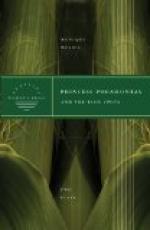The maiden spoke passionately. So had she never spoken to anyone. She ceased for a moment and there was no sound save the call of the owl. Then she turned around and knelt, her elbows on her brother’s knees, and asked:
“Tell me, Nautauquas, tell me the truth, since thou canst speak naught else; what manitou is in me that I am like to rushing water, to a stream that hurries forward? What shall I become?”
“Something great, Matoaka,” he answered; “I know not whether a warrior—such there have been—a princess who shall hold many tribes in her hand, or a prophetess; but I am certain that the arrow of thy manitou shall bring down some fair game.”
“Ah!” she breathed deeply. “I thank thee for thy words, Nautauquas, my brother, and that thou hast not made sport of me.”
“Why should anyone make sport of thee? It is not strange that the aspen should quiver when the wind blows, nor that thou shouldst be swayed by the spirit that is within thee, Matoaka. Some day—”
He was interrupted by a piercing scream from the depth of the forest. He sprang to his feet; all the dreaminess of his attitude and mood had vanished; he pulled an arrow from his quiver fitted it to the string in readiness to shoot. Was it possible, he wondered, for any war party of their enemies to have ventured so near Powhatan’s stronghold without having been halted at other villages belonging to his people? Pocahontas too was on her feet, her head on one side, listening intently.
Again came the scream, then Nautauquas loosened his bow, saying:
“That is no human cry. It is a wildcat in agony. Let us go and see what aileth it.”
They ran swiftly towards the point from which the sound had come. Again came the cry to guide them, and then there was silence as they ran through the moonlight checkered by the shadows of the trees.
Nautauquas stood still suddenly, so suddenly that Pocahontas behind him could not stop quickly enough and fell against him and almost down into a ravine that lay beneath, but Nautauquas caught her on the very brink.
“It is down there,” he pointed; “there must be a trap, I think. Let us descend very carefully.”
They clambered down through the darkness made by the overhanging bushes and rocks. At the bottom the light was not obscured, and they beheld the striped body of a large wildcat caught in a trap.
“Look,” cried Pocahontas excitedly, “there is another beast just there in those bushes. Our coming must have frightened it. He has been trying to kill the one in the trap, that cannot defend himself.”
“That is so,” assented Nautauquas, making ready to shoot the beast that was at liberty in case it should spring towards them. But the animal evidently had no taste that night for an encounter with human beings, and slouched off and up the side of the ravine. The imprisoned animal, they could see, was bleeding from a large wound on its back, and in the moonlight its eyes shone like fire.




